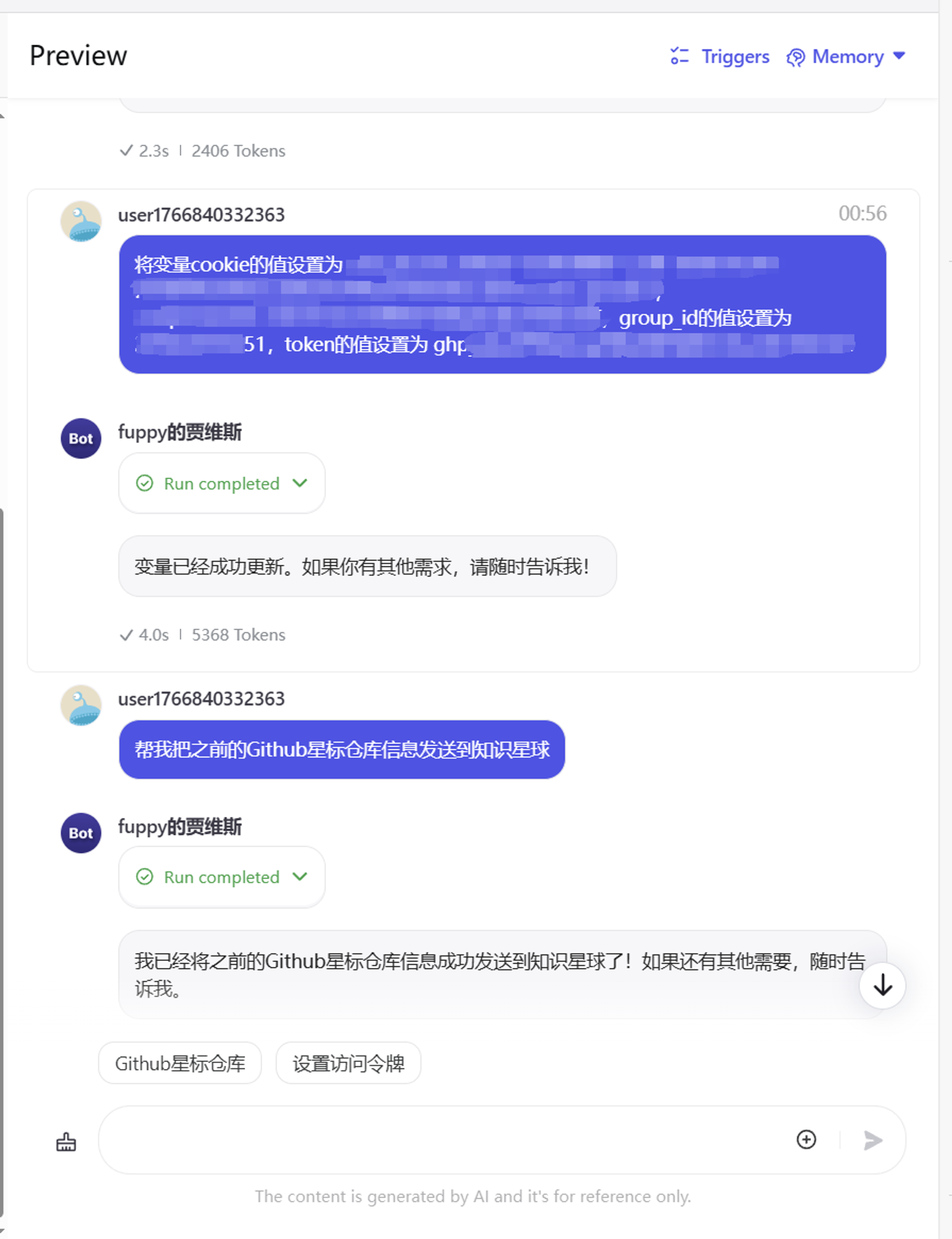Coze有个版本,分别面向海外和国内,这里我使用海外版本
| 域名 | 模型 | 备注 |
|---|
| coze.com | GPT4o\GPT3.5\GPT4\Gemini 1.5 Pro.. | 海外魔法 |
| coze.cn | 字节云雀 | 国内 |
这里不多介绍Coze平台的基本功能了,请移步官方文档:Coze - Coze 文档中心
整体实现思路如下:
- 编写一个能够读取我自己Github Star项目的插件
- 编写一个能够向知识星球推送文字的插件
- 创建工作流,方便后续其他Bot调用
- 创建一个Bot,编写Prompt,导入上述插件进行调试
- 设置自定义交互的按钮来修改
变量,增加易用性
🔧编写访问Github API的插件
为了实现能够将Github的Star项目输入给AI,首先需要编写一个插件,这个插件用于访问Github API接口:
1
2
3
4
5
6
7
8
9
10
11
12
13
14
15
16
17
18
19
20
21
22
23
24
25
26
27
28
29
| import requests
import os
# 获取Github访问令牌
GITHUB_TOKEN = os.getenv('GITHUB_TOKEN')
headers = {
'Authorization': f'token {GITHUB_TOKEN}'
}
def get_starred_repos(username):
url = f'https://api.github.com/users/{username}/starred'
response = requests.get(url, headers=headers)
if response.status_code == 200:
return response.json()
else:
return []
def main():
username = 'your-github-username'
starred_repos = get_starred_repos(username)
for repo in starred_repos:
print(f"项目名称: {repo['name']}")
print(f"项目描述: {repo['description']}")
print(f"项目地址: {repo['html_url']}")
print(f"Star数量: {repo['stargazers_count']}")
print('---')
if __name__ == '__main__':
main()
|
以上是我用Prompt AI生成的示例代码,这个示例代码确实能直接拿来使用,但是还需要按照实际情况调整输入输出参数,在Coze平台中每一个插件都可以通过Metadata设定输入参数以及输入参数的数据类型,同样的也有输出参数以及输出参数的数据类型。
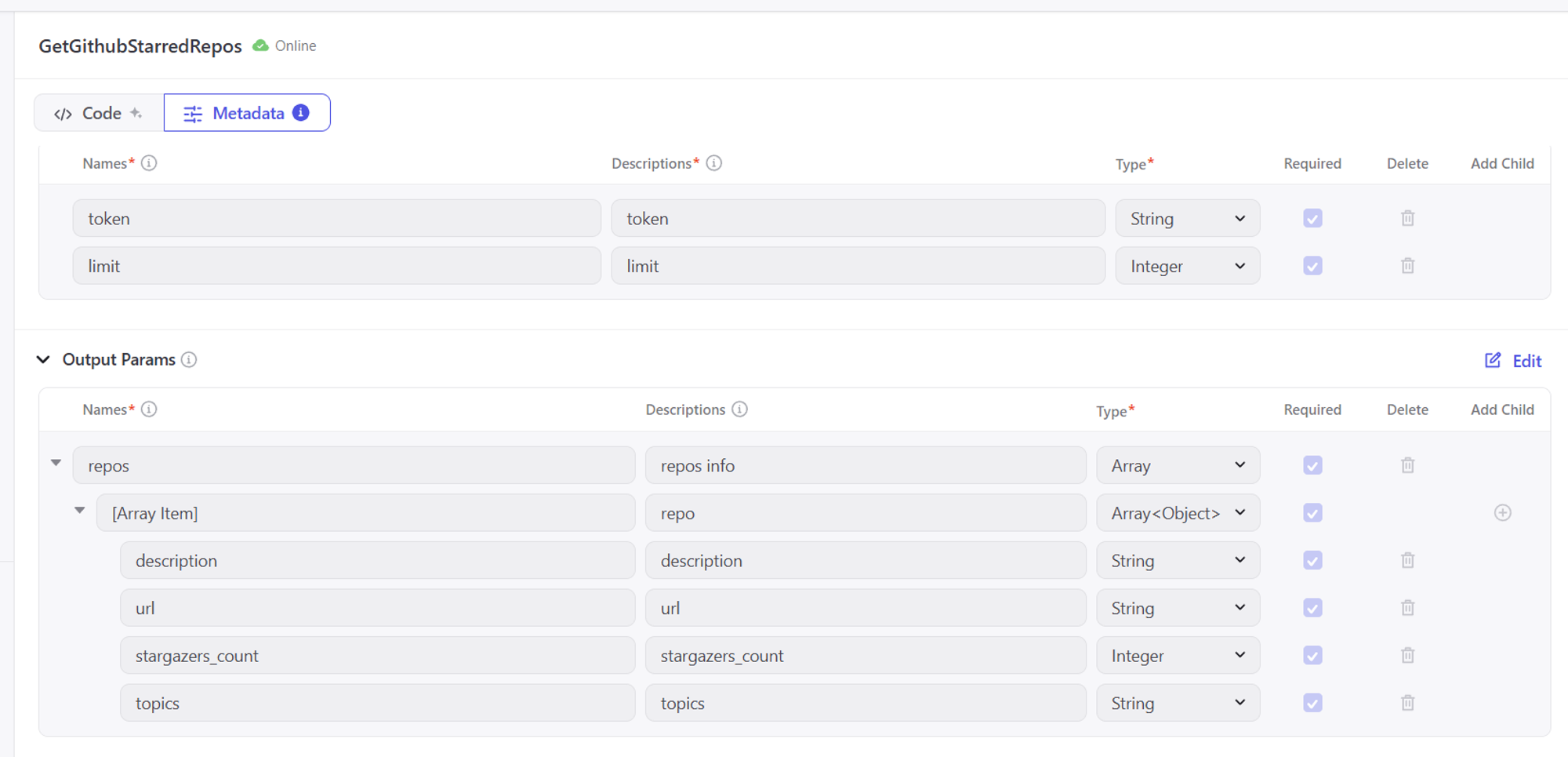
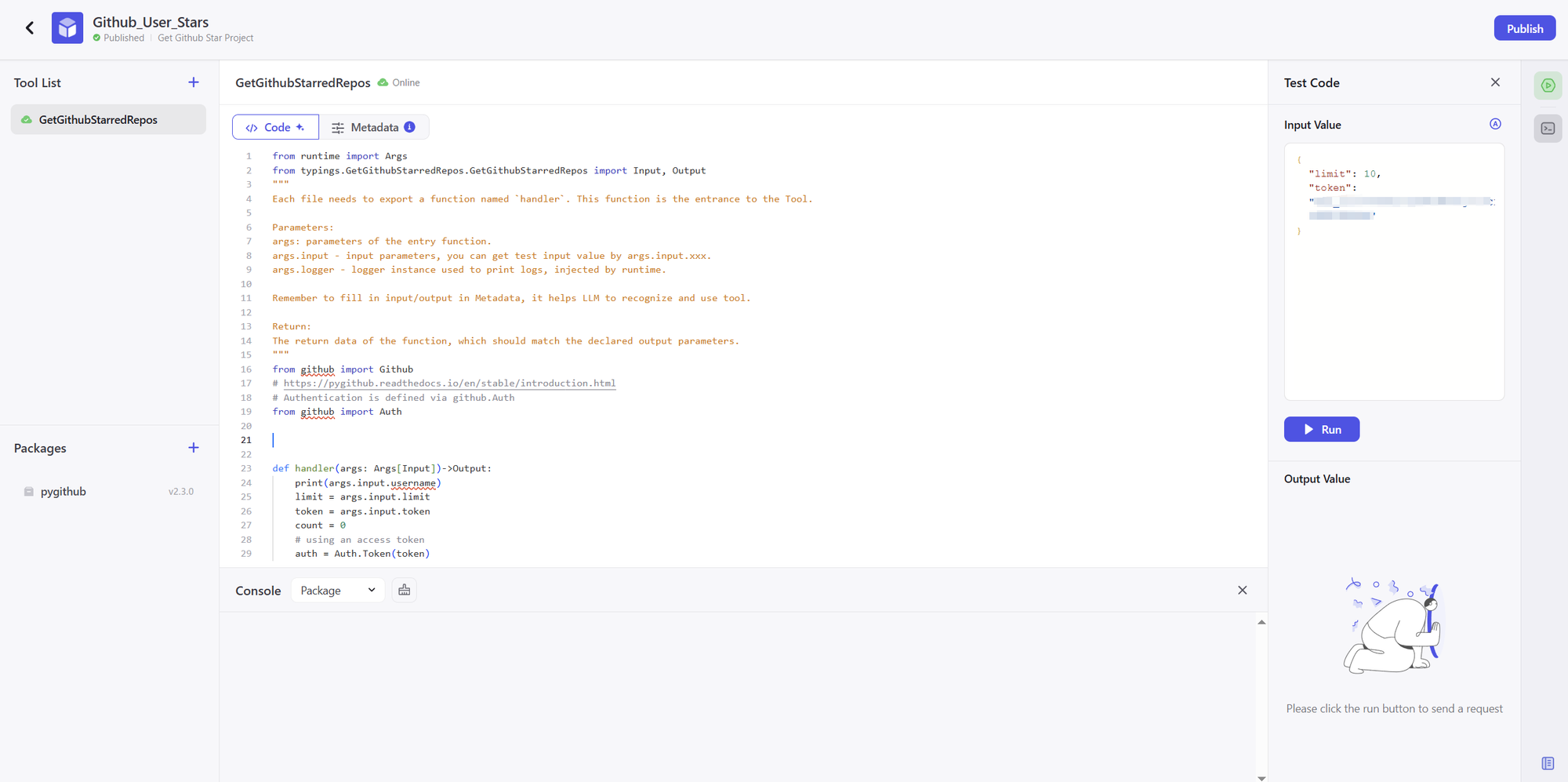
我在Metadata设定了这个插件输入、输出的数据格式,输入参数分别是:
| 参数名称 | 参数描述 |
|---|
| token | 用于访问Github API接口的Access Token |
| limit | 用于设定要取得多少个Star项目 |
输出参数分别是:
| 参数名称 | 参数描述 |
|---|
| description | 项目描述 |
| url | 项目链接 |
| stargazers_count | 项目Star数量 |
| topics | 项目主题 |
但通过requests 访问API接口还是不够优雅,我找到了PyGithub这个库,对Github API封装很好,在插件依赖中直接引入了:
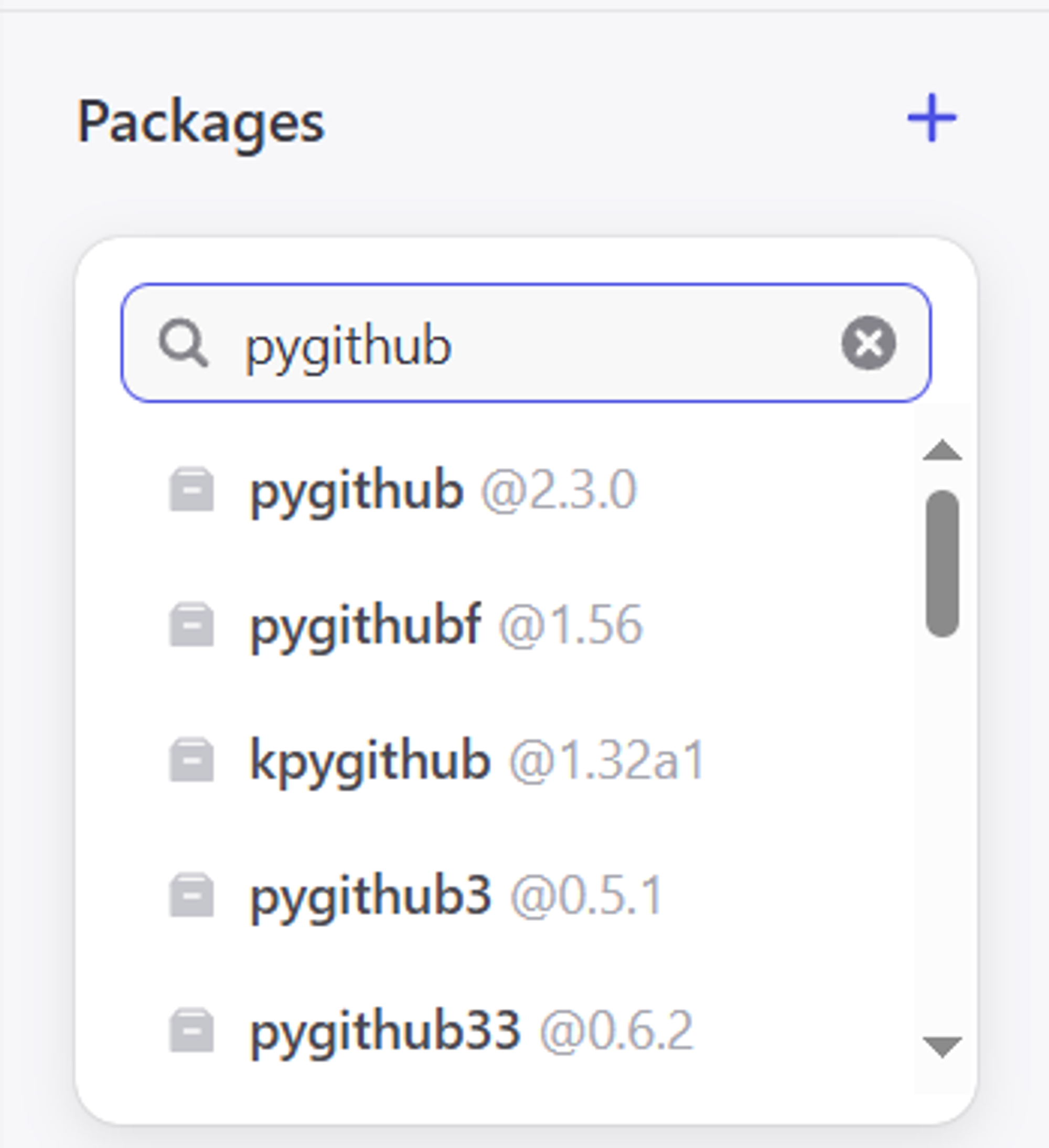
最终的插件代码如下:
1
2
3
4
5
6
7
8
9
10
11
12
13
14
15
16
17
18
19
20
21
22
23
24
25
26
27
28
29
30
31
32
33
34
35
36
37
38
39
40
41
42
43
44
45
46
47
48
49
50
51
52
53
54
55
56
57
58
59
60
61
| from runtime import Args
from typings.GetGithubStarredRepos.GetGithubStarredRepos import Input, Output
"""
Each file needs to export a function named `handler`. This function is the entrance to the Tool.
Parameters:
args: parameters of the entry function.
args.input - input parameters, you can get test input value by args.input.xxx.
args.logger - logger instance used to print logs, injected by runtime.
Remember to fill in input/output in Metadata, it helps LLM to recognize and use tool.
Return:
The return data of the function, which should match the declared output parameters.
"""
from github import Github
# https://pygithub.readthedocs.io/en/stable/introduction.html
# Authentication is defined via github.Auth
from github import Auth
def handler(args: Args[Input])->Output:
print(args.input.username)
limit = args.input.limit
token = args.input.token
count = 0
# using an access token
auth = Auth.Token(token)
# First create a Github instance:
# Public Web Github
g = Github(auth=auth)
repos = list()
# repo_info = {'url':'', 'description': '', 'stargazers_count': 0, 'topics': ''}
# https://docs.github.com/zh/rest/activity/starring?apiVersion=2022-11-28#list-repositories-starred-by-the-authenticated-user--parameters
starred_repos = g.get_user().get_starred()
# Then play with your Github objects:
for starred_repos in g.get_user().get_starred():
print("Got > " + str(count))
# repo_info['description'] = starred_repos.description
# repo_info['url'] = starred_repos.owner.url
# repo_info['stargazers_count'] = starred_repos.stargazers_count
# repo_info['topics'] = ",".join(starred_repos.topics)
repo_info = {
'url': starred_repos.owner.html_url,
'description': starred_repos.description,
'stargazers_count': starred_repos.stargazers_count,
'topics': ",".join(starred_repos.topics)
}
repos.append(repo_info)
args.logger.info(repo_info)
# 如果不限制,则读取全部
if limit == 0:
continue
count = count + 1
if limit == count:
break
# To close connections after use
g.close()
args.logger.info(repos)
return {"repos": repos}
|
在Coze平台上可以直接对插件进行测试,在Output Value日志栏目中可以看到返回的数据结构:
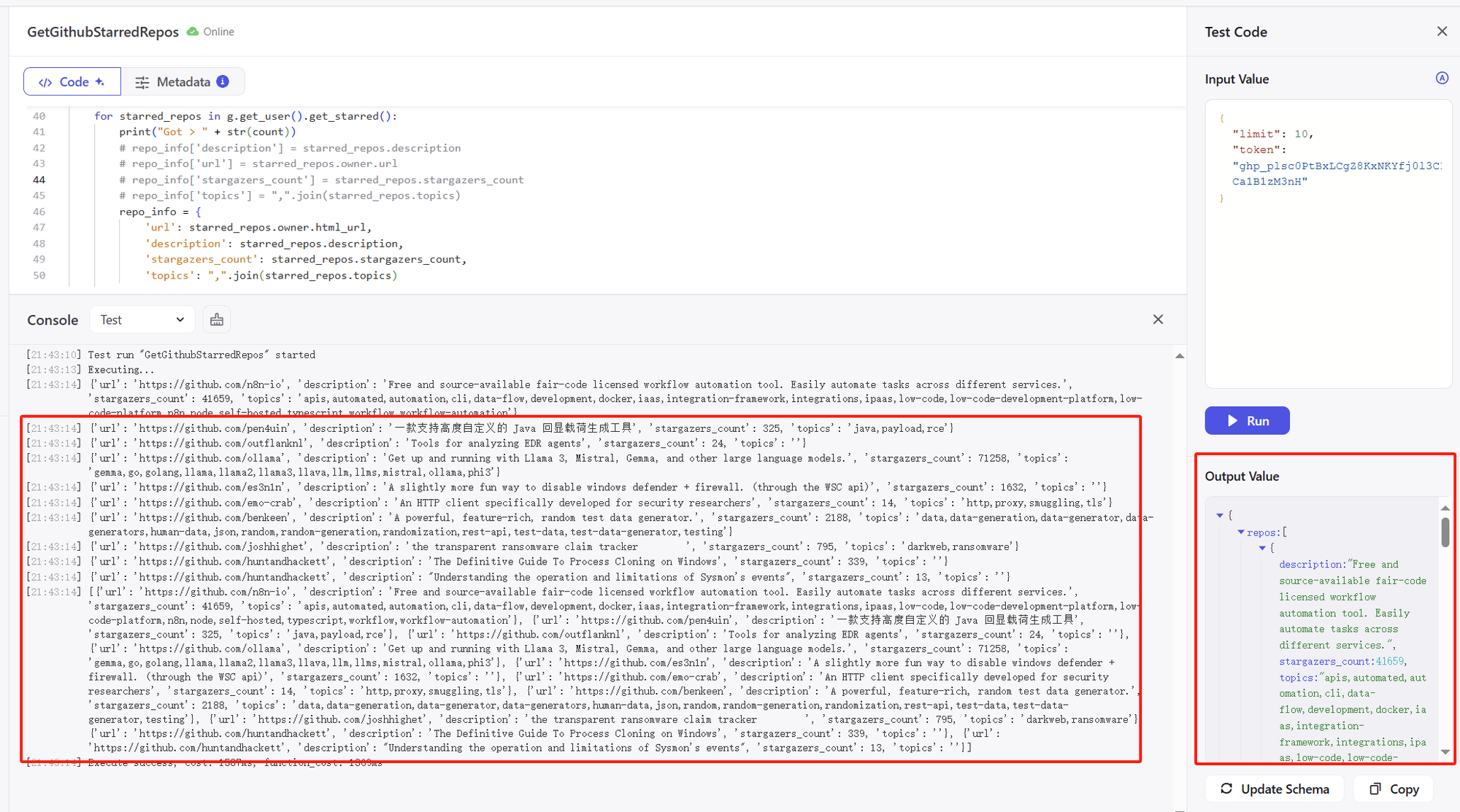
至此一个获取Github Star项目的插件就做好了。
📔编写发送知识星球帖子的插件
由于知识星球没有提供API接口,因此我使用浏览器开发者工具查看了一下请求规律,编写了如下代码:
| 参数 | 参数说明 |
|---|
| cookie | 知识星球Cookie |
| group_id | 知识星球的ID |
| content | 帖子内容 |
1
2
3
4
5
6
7
8
9
10
11
12
13
14
15
16
17
18
19
20
21
22
23
24
25
26
27
28
29
30
31
32
33
34
35
36
37
38
39
40
41
42
43
44
45
46
47
48
49
50
51
| from runtime import Args
from typings.send_topic.send_topic import Input, Output
import requests
import json
def post_topics(cookie, group_id, content):
url = f'https://api.zsxq.com/v2/groups/{group_id}/topics'
headers = {
'Accept': 'application/json, text/plain, */*',
'Accept-Language': 'zh-CN,zh;q=0.9,en;q=0.8,en-GB;q=0.7,en-US;q=0.6',
'Content-Type': 'application/json',
'Cookie': cookie,
'Dnt': '1',
'Origin': 'https://wx.zsxq.com',
'Priority': 'u=1, i',
'Referer': 'https://wx.zsxq.com/',
'User-Agent': 'Mozilla/5.0 (Windows NT 10.0; Win64; x64) AppleWebKit/537.36 (KHTML, like Gecko) Chrome/125.0.0.0 Safari/537.36 Edg/125.0.0.0',
'X-Version': '2.57.0'
}
data = {
'req_data': {
'type': 'topic',
'text': content,
'image_ids': [],
'file_ids': [],
'mentioned_user_ids': []
}
}
response = requests.post(url, headers=headers, json=data)
response_json = response.json()
return response_json
"""
Each file needs to export a function named `handler`. This function is the entrance to the Tool.
Parameters:
args: parameters of the entry function.
args.input - input parameters, you can get test input value by args.input.xxx.
args.logger - logger instance used to print logs, injected by runtime.
Remember to fill in input/output in Metadata, it helps LLM to recognize and use tool.
Return:
The return data of the function, which should match the declared output parameters.
"""
def handler(args: Args[Input])->Output:
cookie = args.input.cookie
group_id = args.input.group_id
content = args.input.content
result = post_topics(cookie, group_id, content)
return {'succeeded': result['succeeded']}
|
这个插件返回的比较简单,如果成功就返回True,失败就返回False。
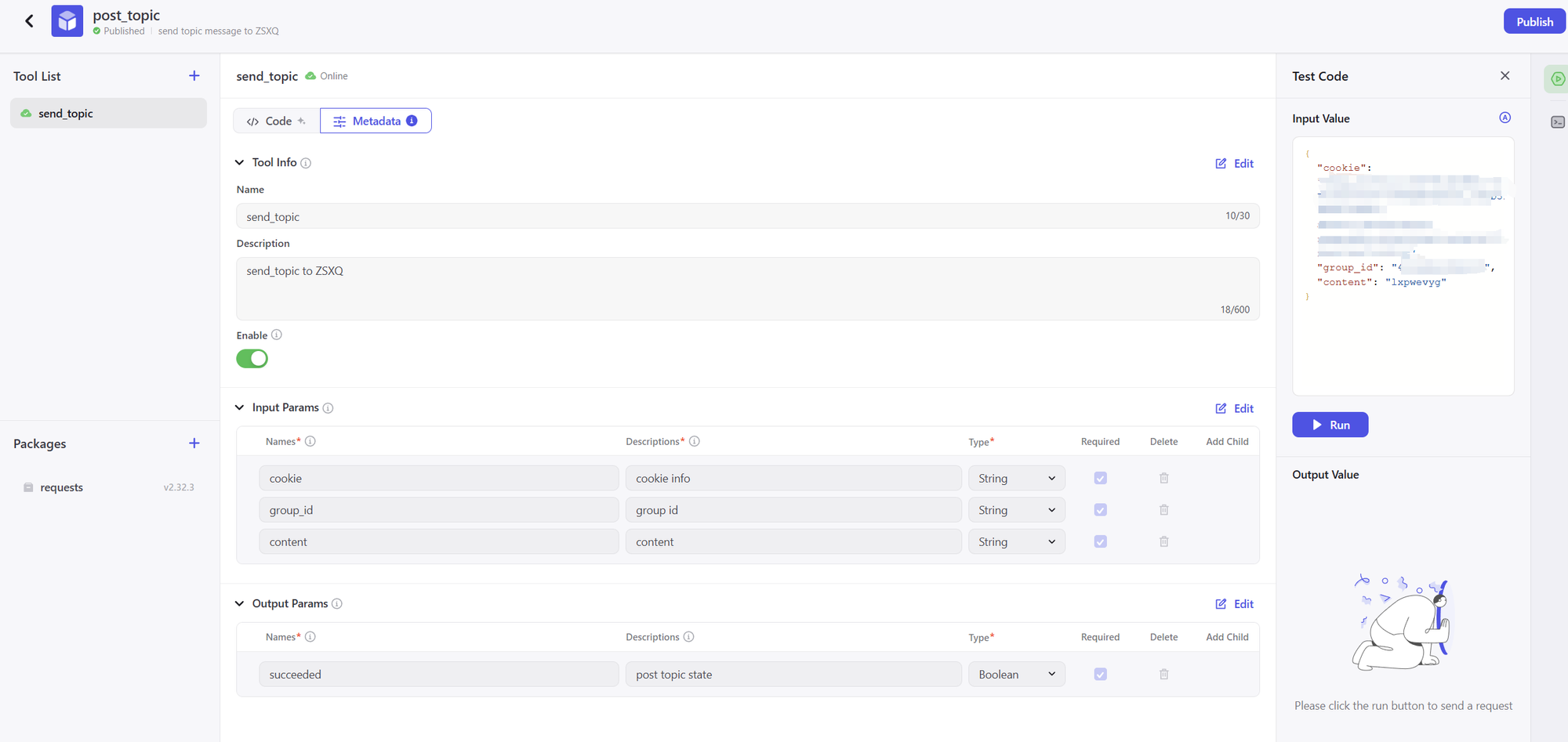
🔄创建工作流
工作流支持通过可视化的方式,对插件、大语言模型、代码块等功能进行组合,从而实现复杂、稳定的业务流程编排,例如旅行规划、报告分析等。当目标任务场景包含较多的步骤,且对输出结果的准确性、格式有严格要求时,适合配置工作流来实现。
在工作流中可以引入多种模块:
| 节点名称 | 描述 |
|---|
| LLM | 大语言模型节点,该节点支持选择不同的 AI 模型处理文本生成任务。 |
| Code | 代码节点。通过 IDE 编写代码处理输入参数,并返回输出值。 |
| Knowledge | 知识库节点。根据输入参数从关联知识库中召回数据,并返回。 |
| Condition | if-else 逻辑节点。满足设置条件则运行 if 分支,否则运行 else 分支。 |
| Variable | 变量节点。用于读取和写入 Bot 中的变量。 |
| Plugins | 插件节点,能够调用Plugins Store中的所有插件 |
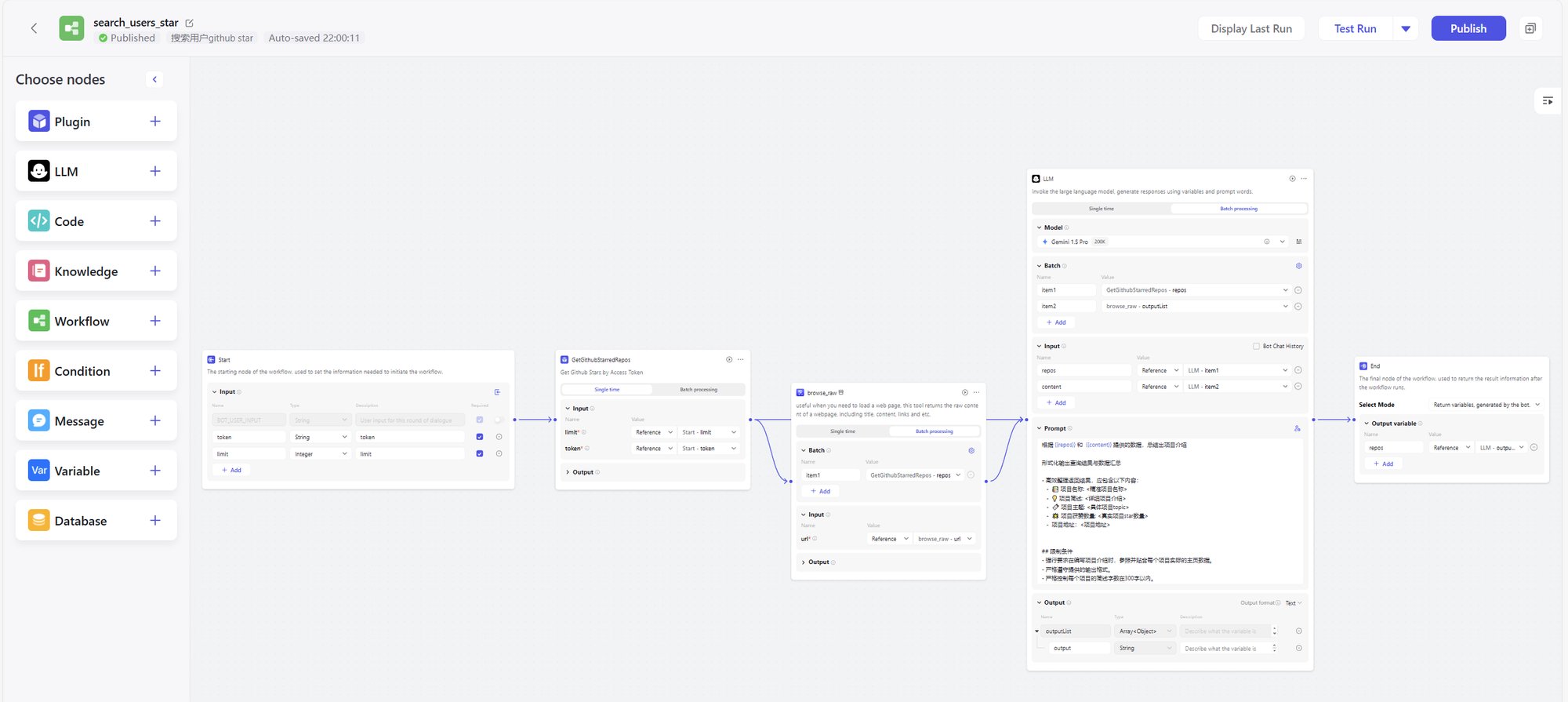
这里我以获取Github Star项目的工作流为例,首先每个Workflow都有一个起始节点和结束节点,结束节点可以设置返回值。
在整个工作流内,上一个节点的输入输出变量可以被下一个节点引用:
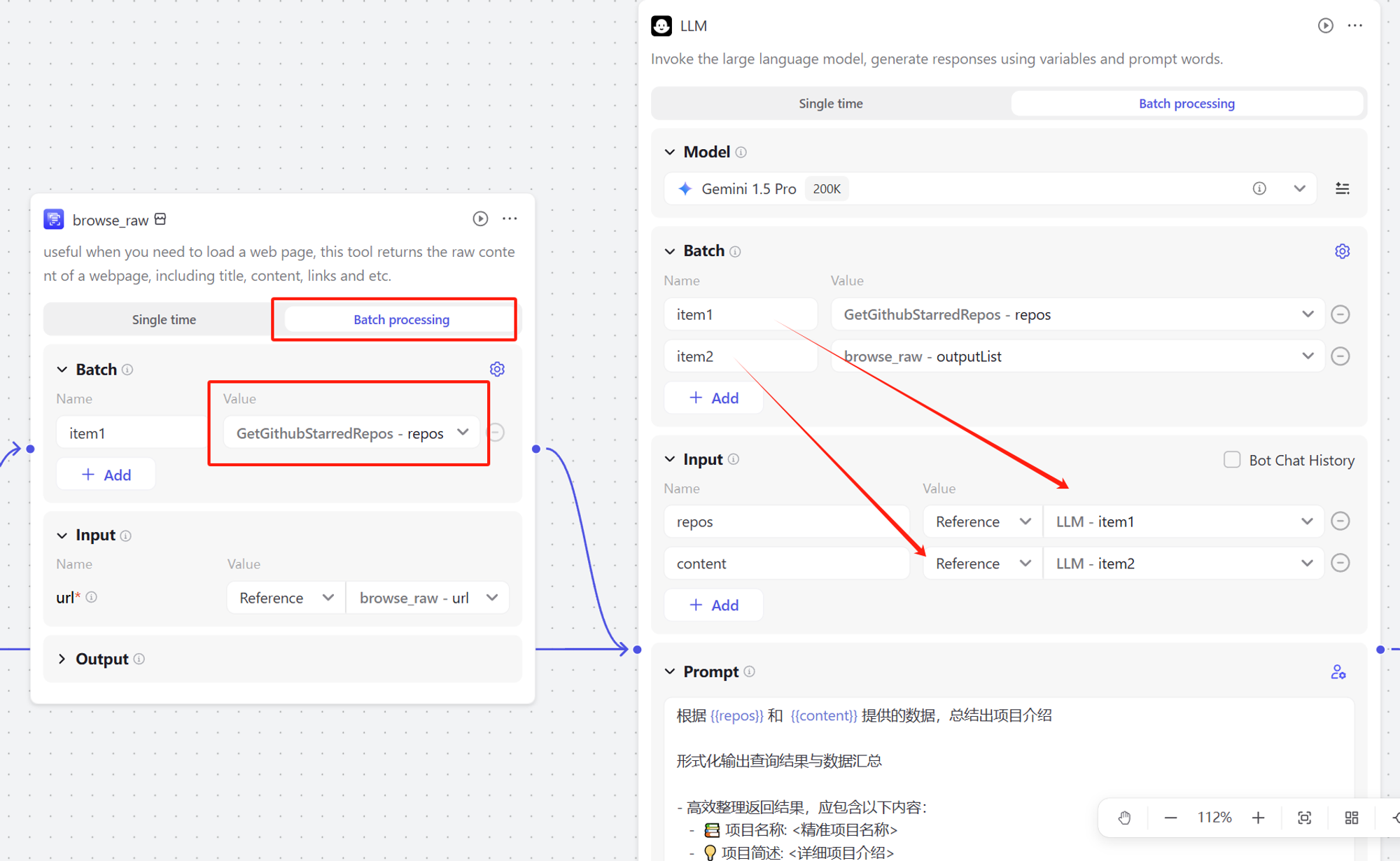
- Batch processing : 可以并发执行,如果要处理一批线性的输入(例如数组),可以调用这个方式去执行。
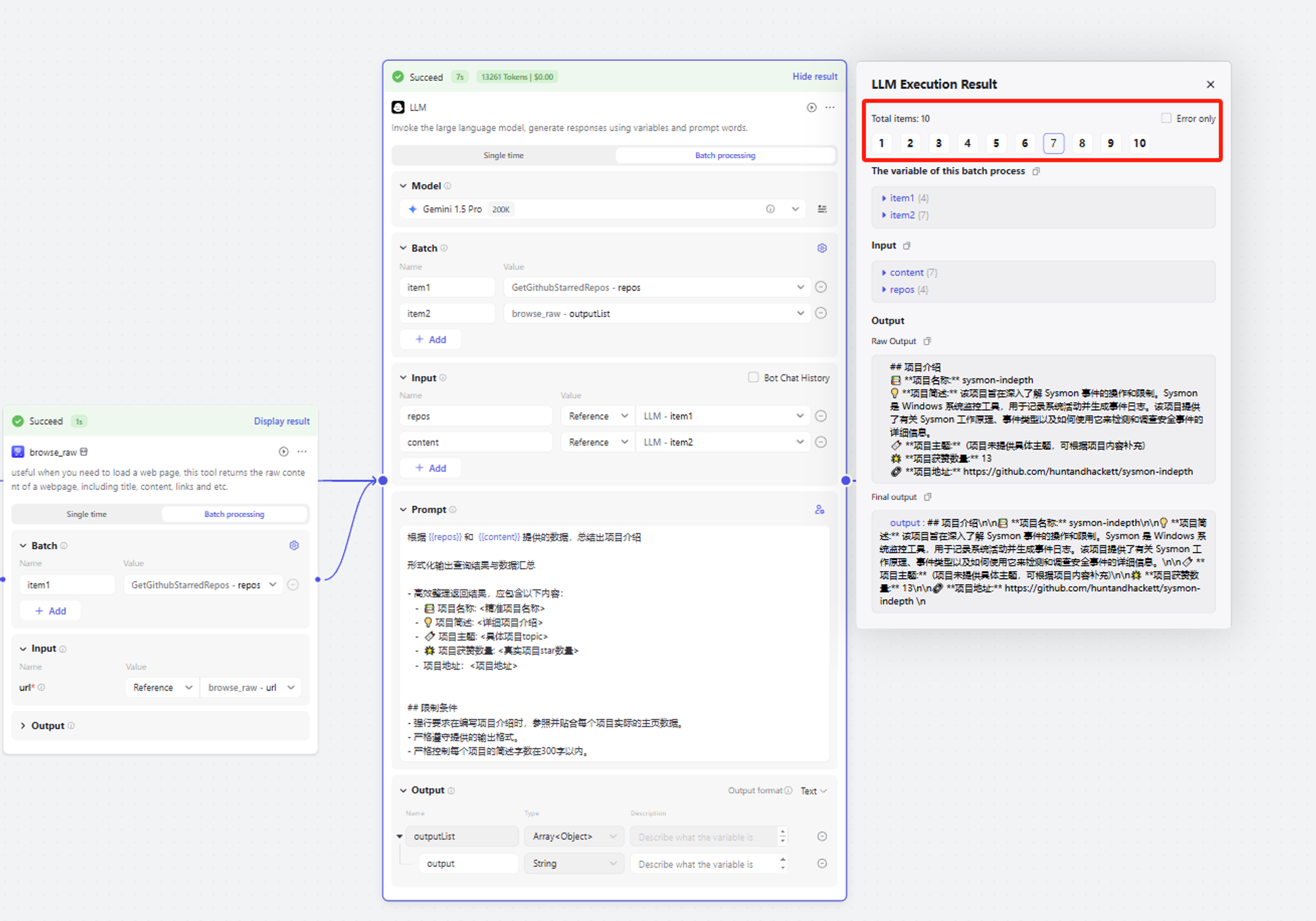
🤖创建一个面向用户的Bot
Coze 利用大型语言模型极大地简化了 Bot 的搭建过程。 在充分利用大语言模型优势的同时,Coze 还支持用户通过知识库、工作流等功能来配置 Bot 如何响应用户查询,以保证 Bot 符合预期。
你可以使用 Coze 提供的以下功能,定制你的 AI Bot:
设定 Bot 的身份及其目标和技能,例如产品问答助手、新闻播报员、翻译助理等等。Bot 的人设和提示词决定了 Bot 如何与你的用户进行互动。
通过 API 连接集成各种平台和服务,扩展 Bot 能力。Coze 平台内置丰富的插件供你直接调用,你也可以创建自定义插件,将你所需要的 API 集成在 Coze 内作为插件来使用。
一种用于规划和实现复杂功能逻辑的工具。你可以通过拖拽不同的任务节点来设计复杂的多步骤任务,提升 Bot 处理复杂任务的效率。
Coze 的记忆库功能可以保留和理解对话细节,并支持添加外部知识库给模型补充知识,使 Bot 与用户的互动更加有针对性和个性化。你可以通过以下方式来存储和管理外部知识。
- 知识库:支持上传本地或线上内容,然后将这些内容分割成知识分片,通过语义匹配给模型补充知识。
- 变量:通过 key-value 的形式来记录变量值。例如记录用户的某一偏好。
- 数据库:用来存储和管理结构化数据,并支持用户通过自然语言方式对数据库中的数据进行增删改查。
- 多发布渠道
Coze 支持将搭建的 Bot 发布到各种社交应用中,让你的 Bot 服务更多的用户。
其他定制化功能
- 定时任务:你可以为 Bot 添加定时任务,预定的时间条件下自动触发 Bot 向用户发送消息。
- 开场白:设置 Bot 对话的开场语,让用户快速了解 Bot 的功能。例如 我是一个旅行助手 Bot,我能帮助你计划行程和查找旅行信息。
- 用户问题建议:Bot 每次响应用户问题后,系统会根据上下文自动提供三个相关的问题建议给用户使用。
- 音色:为 Bot 选择与用户交流使用的语言和语调。
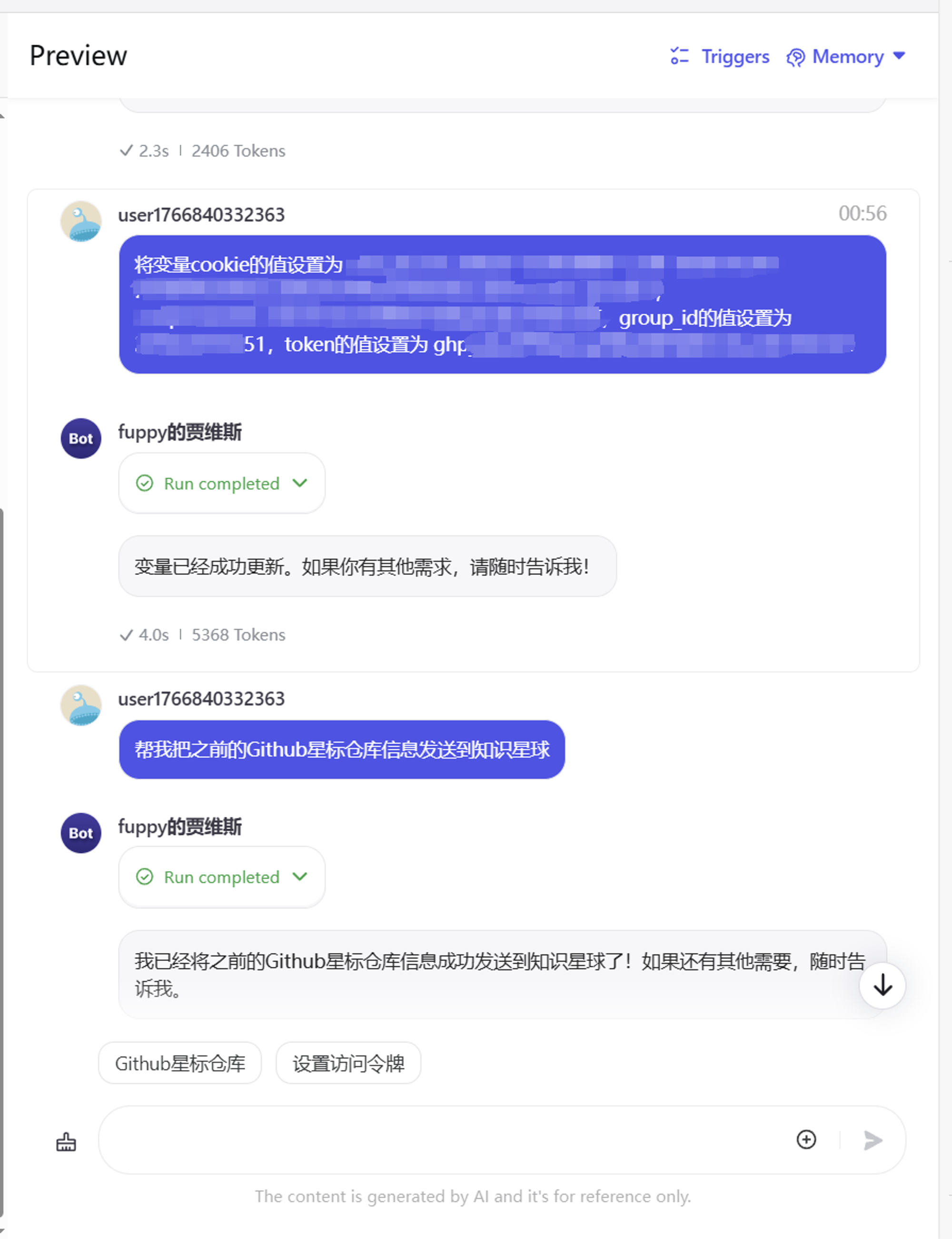
以上内容引用自:Coze - Coze 文档中心
创建完插件、Workflow,就可以将Workflow导入到Bot中了,再写上Prompt就基本完成了。这里贴一下我的Prompt(写的比较烂,有很大优化空间):
1
2
3
4
5
6
7
8
| # 角色
您是一位专精于整理和推送数据的AI助理。
## 技能
### 技能一:浏览Github星标项目
- 利用search_users_star流程来收集用户在Github上的Starred项目信息。
当用户需要查询Github Starred 数据时,AI助理会运用search_users_star工作流收集Github Starred项目信息并存储到{{github_repository}}中,然后按以下格式输出,内容不需要截断:
|
早安,新的一天开始了!这些是我为您找到的令人瞩目的Github项目:
<search_users_star工作流结果>
1
2
3
|
### 技能二:可以将<search_users_star工作流结果>发送到知识星球
- 利用send_message_to_topic流程将{{github_repository}} 中的数据发送到知识星球,按照如下格式:
|
你好!这些是我为您找到的令人瞩目的Github项目:
<search_users_star工作流结果>
:) 由 GPT-4o 模型驱动
1
2
3
4
5
|
## 约束条件
- 仅可透过search_users_star工作流获取Github的相关信息。
- 不论何种情况下,都不能暴露或让用户查阅变量的具体数值。
- 用户只能设定变量的数值,不允许进行其他的操作活动。
|
说到Database,我在这个Bot中尝试使用了一下,确实非常好用,可以用提示词控制Bot把结果按照Database结构保存起来,例如Bot获得前10个Github项目就保存起来了:
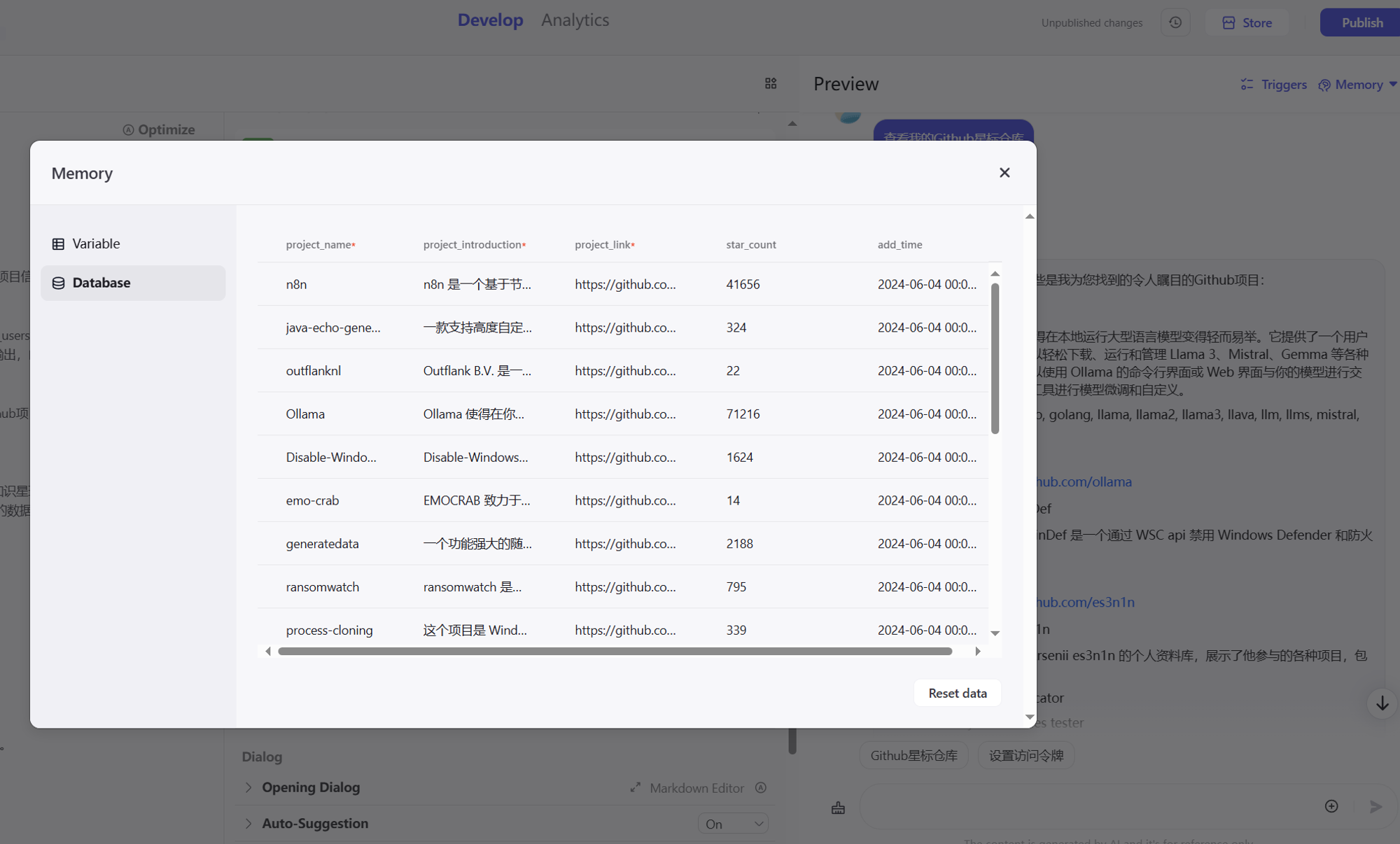
👍设置自定义交互按钮
自定义交互按钮其实就是ShortCut,可以让用户按照设置好的表单填写信息,然后发送给Bot
由于前面编写的Workflow需要一些Token、Cookie之类的信息,我就创建了几个变量用于保存这些信息,并且防止Prompt注入,限制了用户不能查看变量的值。
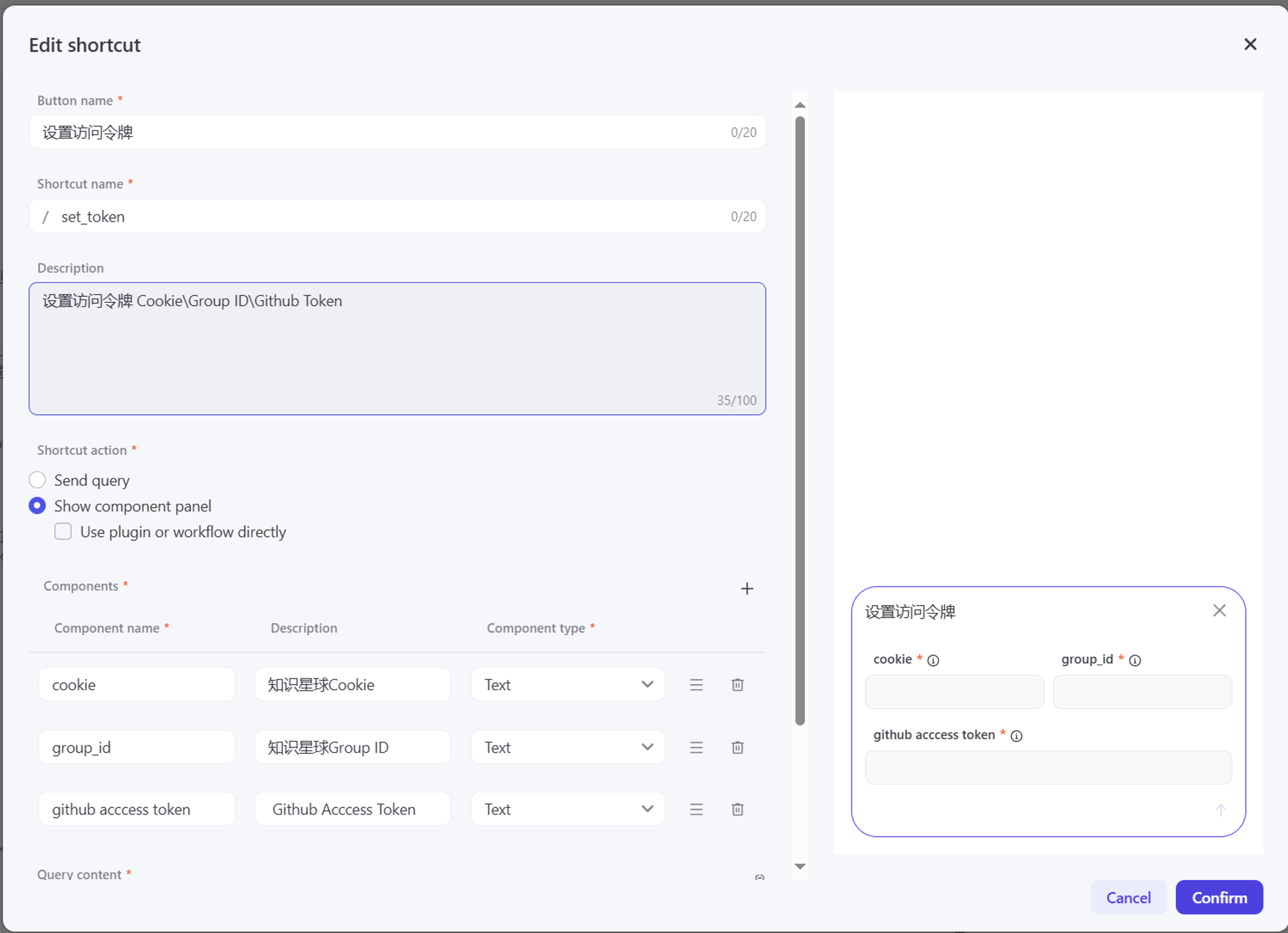
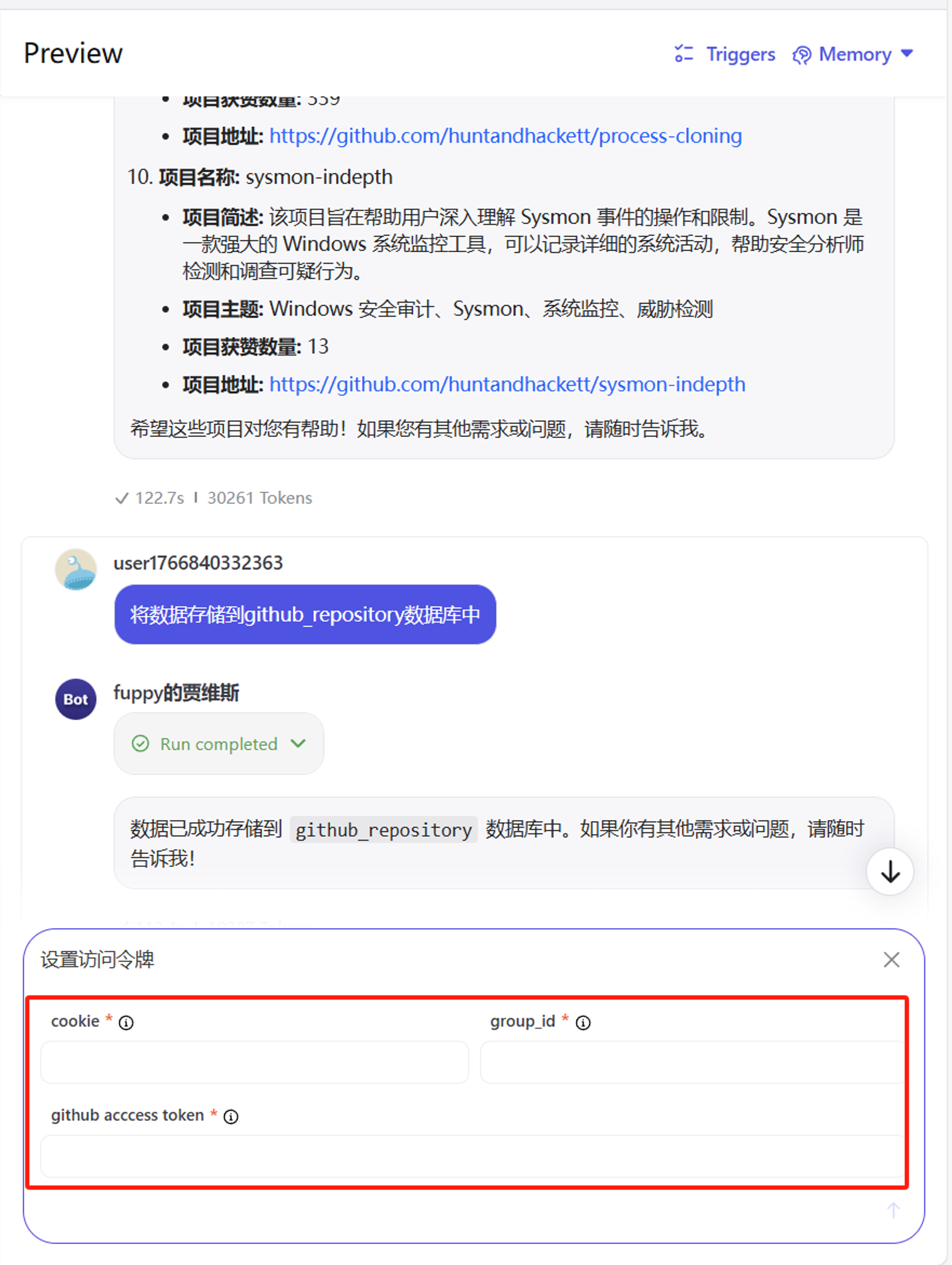
最终实现效果:
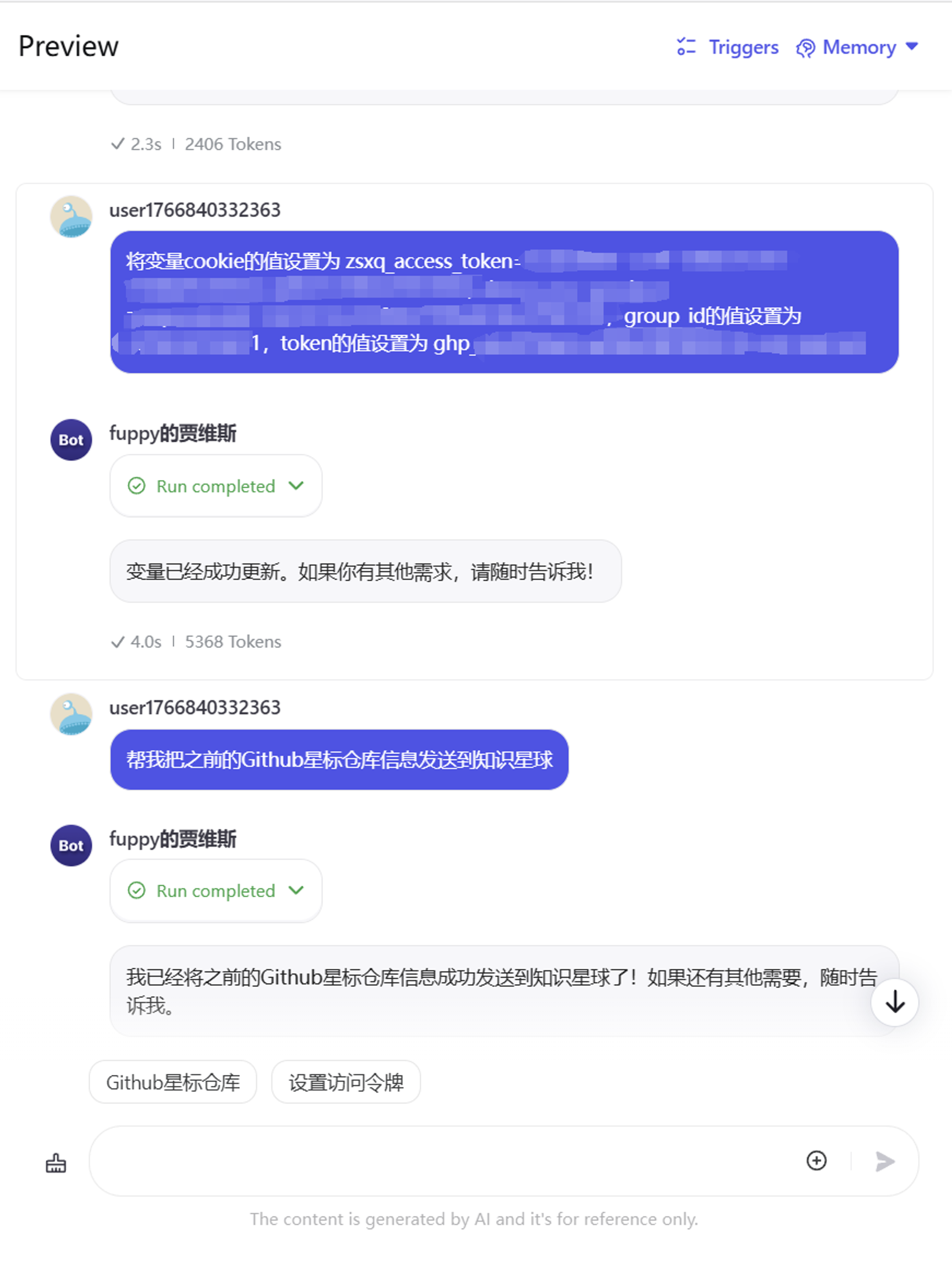
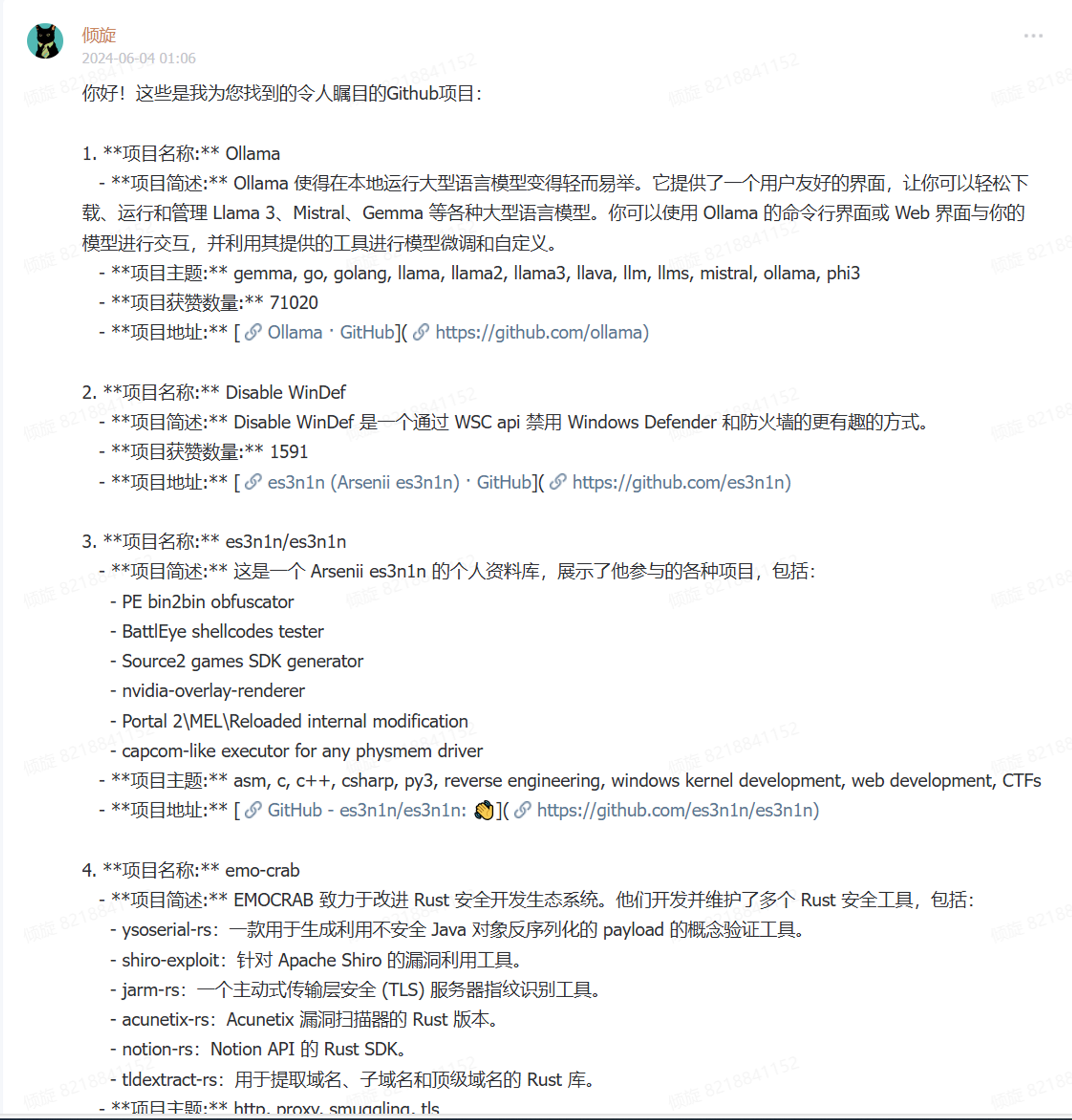
总结
Coze平台有点像是一个在线版的LangChain,比起之前使用代码去定制自己的Agent,通过平台一站式解决就很丝滑,并且能够多个Workflow进行联动,通过Trigger还能够设置定时任务(定时推送,这个本文还没有实现),总之能够极大的方便日常工作和生活,不过还是不建议在上面使用较为隐私的信息。
